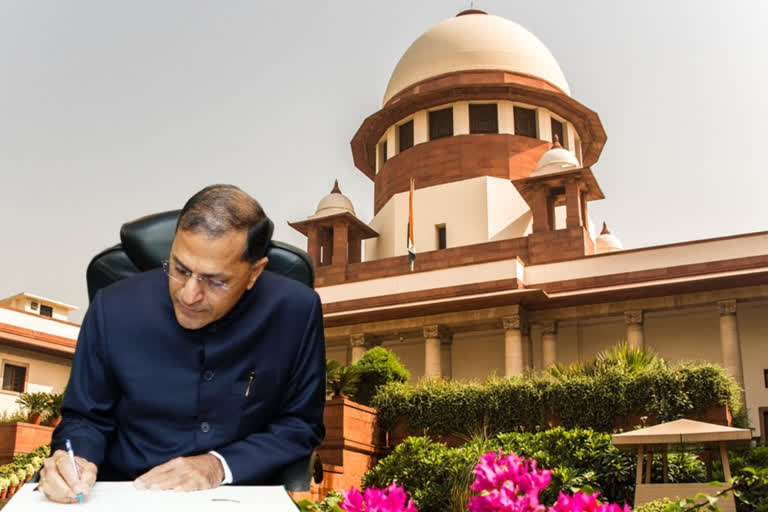New Delhi:The Supreme Court on Thursday questioned the process adopted for appointing Arun Goel as an Election Commissioner (EC), and said his file got clearances in "haste" and with "tearing hurry". The Constitution Bench is hearing a batch of pleas seeking a collegium-like system for the appointment of ECs and the Chief Election Commissioner.
The Bench Wednesday directed the Centre to place the file of appointment of Arun Goel as EC before the Bench to better understand the process adopted. "What kind of evaluation is this? Although, we are not questioning the merits of Arun Goel's credentials but the process," a five-judge Constitution bench headed by Justice K M Joseph said.
The apex court observed that the file pertaining to Goel's appointment was cleared with "lightning speed". Taking objections to the remarks related to the speed made by the Constitution Bench, the Centre through its Attorney General R Venkataramani urged the bench not to make observations without looking into the entire issue pertaining to the appointment process.
Lawyer Prashant Bhushan, appearing for petitioner Anoop Baranwal, attempted to make submissions before the bench when the AG was arguing, provoking the government's law officer. "Please hold your mouth for a while, he curtly told Bhushan.
Also read:Need a CEC who can even take action against prime minister, says SC
The top court reserved its verdict on a batch of pleas seeking a collegium-like system for the appointment of ECs and the Chief Election Commissioner and asked the parties to file written submission in five days. Justice Ajay Rastogi, who is also a part of the bench, told Venkataramani, "You have to listen to the court carefully and answer the questions. We are not on individual candidates but on the process."
The attorney general said he is bound to answer the questions of the court. The top court said the 1985-batch IAS officer got voluntary retirement from service in a single day, his file was cleared by the Law Ministry in a single day, a panel of four names were put up before the prime minister and Goel's name got the nod from the President within 24 hours.
The bench, which also comprised Justices Aniruddha Bose, Hrishikesh Roy and CT Ravikumar, said none of the four names in the panel were "carefully hand-picked" by the Law Minister so that they could complete a six-year tenure. Venkataramani responded that there is a mechanism and criteria for selection and there cannot be a scenario where the government has to look back at every officers' track record and ensure that he completes the six-year tenure.
Referring to Goel's appointment, the Attorney General said his profile is important and not the voluntary retirement which is being made an issue. The bench said the 1991 Act says that the EC's tenure is of six years and the government has to ensure that the person who holds the post completes the stipulated period.
Also read:'If everything is hunky-dory': SC asks Centre to produce file related to appointment of EC Arun Goel
The top court said it is "struggling" to find the reasons and objects on how the Law Minister selected a panel of four names who were not going to complete the stipulated six-year tenure. The apex court perused the original file of Goel's appointment as an EC, which was placed before the bench by the Centre in pursuance of Wednesday's direction given by the top court.
Senior Advocate Gopal Sankarnaryana who appeared for the petitioner said that the Centre has not appointed anyone who gets 6 years tenure as the EC. "How do you curtail someone from getting 6 years when the constitution says it? EC has now become a cadre from the bureaucracy. That there are seniority basis on which people are appointed. The Law is completely different. Parliament has said you need to ensure 6 years. That is for security of tenure. You put in a man for 6 months. It doesn't seem to us that this institution can remain independent or remain secure," Sankarnarayana submitted.
"There is an immense vacuum. No law. If the independence of the EC is crucial for democracy, then even a perception shouldn't arise. System should seem to be reasonably independent. Let me draw a parallel with the judiciary. The court found a vacuum and filled it up. Now if it is in the EC, then that should also be filled up," Sankarnarayana argued.
